‘Rape Club’ Prison’s Legacy Continues to Haunt in Criminal, Civil Trials– Even the Warden Was Involved

How can anyone forget the years of sexual assault, rape, humiliation and terror that the staff of the infamous Dublin, Calif. federal women’s prison inflicted on its unfortunate residents?
Seven employees of Federal Correctional Institution (FCI) Dublin– a low-security prison– have been convicted or pled guilty to charges of sexual abuse of inmates in the past few years. No doubt their wrists are still stinging from the feather-light punishment they received.
One of the “Dublin 8” has pled not guilty and awaits trial. He is Darrell Wayne “Dirty Dick” Smith, whose case was featured in The Daily Muck on Aug. 26. He is set for trial in March 2025.
Smith could face two life sentences if convicted and sentenced to maximum penalties for aggravated sexual abuse and deprivation of civil rights, according to a Justice Department press release. He also faces six counts of sexual abuse and seven counts of abusive sexual contact.
While Smith is the only criminal case known to be pending involving the recently-closed “Rape Club” federal prison, there are numerous civil suits filed against the Bureau of Prisons (BOP) and staff members alleging years of sexual abuse of women prisoners. One is a class action suit involving eight inmates.
The Dublin 8
The DOJ often puts the “maximum penalty” in its press releases when announcing an arrest, indictment or conviction/guilty plea. It gives a “tough on crime” impression. Sentences are usually handed down a month or two later. Those press releases don’t remind readers what the “maximum” sentences could’ve been and are almost always significantly lighter.
For those wondering what happened to the first seven members of the Dublin 8, you may want to sit down and make sure you are not holding a hot beverage in your hand before reading further. As noted in a June 11 motion in the pending class action lawsuit, these are the sentences handed down so far, listed in order of sentence length:
- Food Supervisor Andrew Jones. Pled guilty to six counts of sexually abusing an inmate and one count of making false statements. SENTENCE – 96 months (8 years).
- Prison Chaplain James Highhouse. Pled guilty to two counts of sexual abuse, two counts of abusive sexual contact, and one count of making false statements. SENTENCE – 7 years.
- Officer Nakie Nunley. Pled guilty to four counts of sexual abuse, five counts of abusive sexual contact, and one count of making false statements. SENTENCE – 6 years.
- Warden Ray Garcia. Convicted of three counts of sexual abuse, four counts of abusive sexual contact, and one count of making false statements. SENTENCE – 5 yrs., 10 mos.
- Safety Manager John Bellhouse. Convicted of two counts of sexual abuse and three counts of abusive sexual conduct. SENTENCE – 5 yrs., 3 mos.
- Prison Cook Enrique Chavez. Pled guilty to one count of abusive sexual contact. SENTENCE – 1yr., 8 mos.
- Recycling Technician Ross Klinger. Pled guilty to three counts of sexual abuse. SENTENCE – one year of home confinement (time served) in exchange for cooperating with the government.
You read that correctly: so far, no one has received more than an eight-year sentence even after admitting to sexually abusing multiple vulnerable women in their charge at FCI Dublin. The charges against these seven men were far fewer than the number of allegations against them. Believe it or not, some were charged with fewer incidents than they admitted to committing.
Crimes and No Punishment
This is not a sequel to Doestevsky’s masterpiece but a statement of fact. The alleged abuse, up to and including what would be defined as rape under the law outside the walls of a prison, made it into the government’s motions and summaries but never came before a jury or judge to determine guilt and penalties for those crimes.
Even the warden was involved. And not just in covering up the scandal but as an active participant in the crimes.
Garcia’s Criminal Case

While FCI Dublin has a long history of sex scandals, its final path to oblivion began with Warden Ray Garcia’s reign of abuse from late 2019 to mid-2021.
Garcia was arrested in September 2021, convicted in December 2022 and sentenced on March 22, 2023. In a March 23 update to the initial press release, the U.S. Attorney for Northern California announced Garcia would serve 70 months in prison for sexually abusing three female inmates and lying to federal investigators.
The offenses occurred while Garcia was employed as associate warden and then warden of the women’s prison.
“The defendant in this case abused his authority as a warden and violated his oath to protect those in the custody of the Bureau of Prisons,” Deputy Attorney General Lisa O. Monaco said at the time. “The sentence he received today is another step forward in our ongoing efforts to root out sexual misconduct within the BOP.”
U.S. Attorney Ismail J. Ramsey said the “evidence in this case paints a disturbing picture of a former warden who abused the trust placed in him, as well as authority granted to him, all while thinking he could get away with his crimes by lying to investigators and intimidating his victims.”
“Rather than ensuring that female inmates at the Dublin prison were safe and secure, Garcia used his position as warden to sexually abuse three inmates over multiple years, intimidated inmates and lied to cover up his crimes, and created a heinous culture that failed to protect female inmates from widespread sexual abuse and violence at the hands of other Dublin employees,” DOJ Inspector General Michael E. Horowitz noted.
He said putting Garcia in prison for just shy of six years holds him “accountable for his disgraceful actions and sends a clear message to every BOP employee about the serious consequences of engaging in such conduct.”
Garcia Told Victims He Could ‘Never Be Fired’
The government reported in a March 8, 2023, sentencing memorandum that Garcia would discourage his victims from reporting his actions by telling them he was “friends with the person in charge of investigating sexual abuse of inmates” and that he could “never be fired.”
The DOJ press release said Garcia “created and perpetuated a culture of abuse” at the prison.
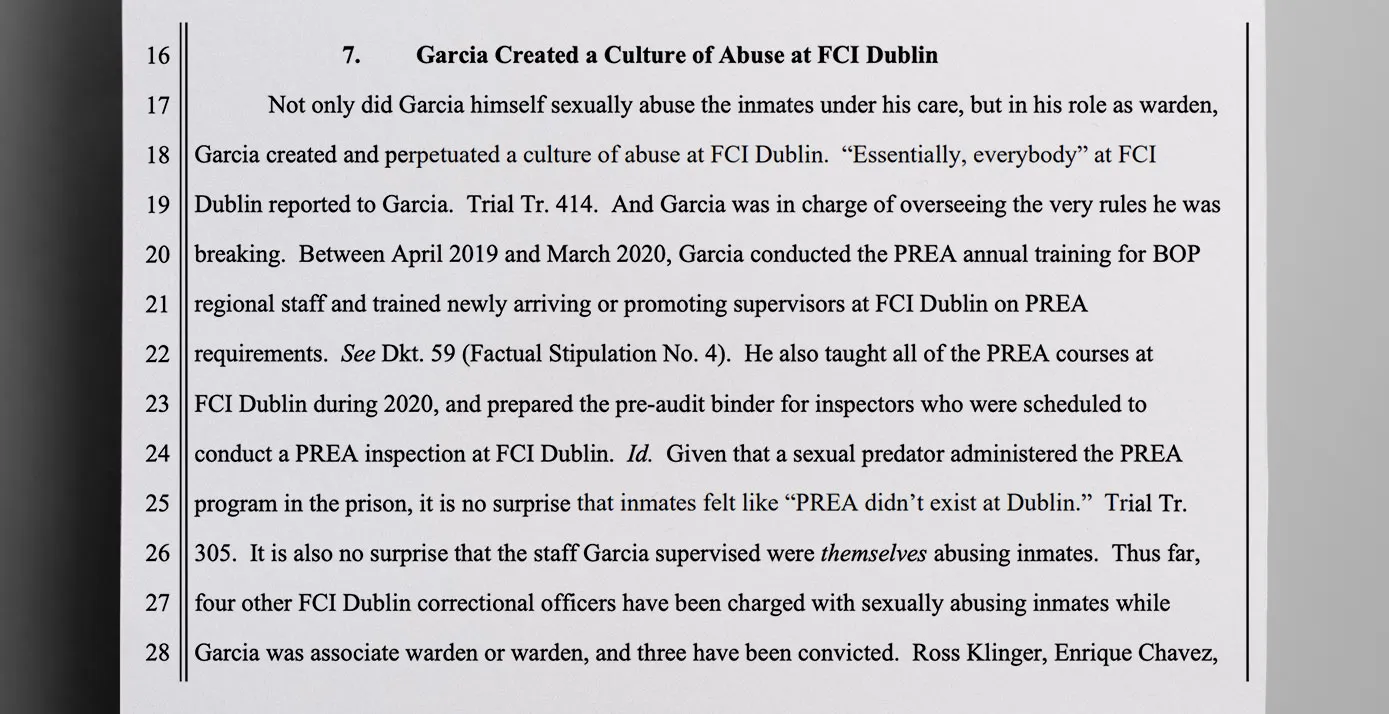
The “making false statements” charge was based on Garcia’s assertion in July 2021 that he “never asked inmates to be undressed for him and that he had never touched an inmate inappropriately. Trial evidence showed that Garcia had already asked multiple inmates to undress for him and had also touched Victim 1, Victim 2 and Victim 3 in a sexual manner.”
In addition to the offenses for which he was convicted, former FCI Dublin warden Ray Garcia had committed the same or worse on other inmates. He also told his victims that if they reported him, he wouldn’t be punished, but they would, the memorandum stated.
The seven other women who spoke to authorities included two who testified in court.
Specific Crimes
One inmate said Garcia made sexual comments and told her to strip for him. She said she felt she couldn’t say no because Garcia could ruin her life in prison.
Another woman said she was lifting weights when Garcia grabbed her butt cheek. He told her, “I couldn’t help myself.” When he saw her running on the track, he asked her to slow down because he liked to “see it jiggle, wiggle.”
Two who did not testify in court gave accounts that closely matched those of the other victims. They both said he flattered them and complimented them at first and then began telling them to strip naked for him. One woman said she felt uncomfortable but was afraid she would be sent to solitary confinement if she refused.
Garcia gave one inmate jewelry for letting him take nude photos of her and having her strip for him. His relationship with this inmate was more intense than the others, who only had to endure an occasional probing finger. This woman said they had oral, vaginal and anal sex multiple times in the prison.
Another prisoner said Garcia asked to take a picture of her, made inappropriate comments and told her to “spend time” with him in a supply closet if she wanted help with an administrative request. She said she went into the closet with Garcia twice, where he would grope her and force her to perform oral sex on him while he forcefully pushed her head down.
The last inmate said Garcia put his fingers in her twice and used her hand to stroke his penis.
Give Garcia More Time
Federal judges use sentencing guidelines that consider the severity of the crime, the offender’s previous criminal record and other factors before handing down the penalty. The U.S. Sentencing Commission upgraded the offense level for sexual abuse of an inmate on Nov. 1, 2023, saying stiffer penalties were needed to punish the crimes and deter future misbehavior, according to the latest version of the Sentencing Guidelines.
Judges retain the discretion to impose sentences less than the recommended sentencing range or higher based on the circumstances of individual cases.
After reviewing the relevant factors, the sentencing recommendation for Garcia of 46 to 57 months was made on March 1, 2023, according to the DOJ’s March 8 motion seeking a harsher sentence.
The prosecutors pointed out that in addition to the charges involving the three women in the criminal case, the government had two additional victims who testified at trial and five non-testifying victims who gave statements “to detail Garcia’s abuse.”
Some of the acts the other seven inmates allege are more serious than those for which Garcia was charged and convicted.
The motion said Garcia’s crimes “were extraordinarily serious. Because the advisory guidelines’ range fails to account for the seriousness of Garcia’s crimes, the government respectfully moves this court to vary or depart upward and impose a sentence of 180 months in prison, a supervised release term of 15 years, a $20,000 fine, and $800 in special assessments.”
“While this is a significant upward variance or departure from the Guidelines, it is a necessary one,” the U.S. Attorney’s Office added.
As noted, Garcia was ordered to serve 70 months in prison – less than half of what prosecutors deemed a more appropriate sentence but two years longer than the minimum recommendation. Garcia was also ordered to pay a $15,000 fine and have 15 years of supervised release after his prison sentence concludes.
He is serving his sentence in Iowa State Penitentiary.
Prosecutors Argued for Upward Adjustment to Sentence
The government attorneys even used another Dublin 8 case to support their argument, noting that Highhouse – the chaplain – pled guilty to abusing one inmate. He admitted to two counts of sexual abuse, two counts of abusive sexual contact, and one count of lying to investigators about those incidents.
The sentencing recommendation was 24 to 30 months. Prosecutors were so outraged that a chaplain would use his position to abuse a female inmate on numerous occasions that they pointed out during sentencing that there was also evidence he had sex with another inmate and made inappropriate sexual remarks to other inmates.
The judge eventually sentenced Highhouse to 84 months in prison based on “the systematic nature of the conduct, the length of time that the conduct occurred, the number of instances of abuse, sexual assault and rape, the involvement of multiple victims who were also inmates at Dublin and were subjected to the same sort of abuse,” the DOJ recounted.
The motion argued that Garcia’s abuse “was systematic and far-ranging.” The warden “had almost limitless power at FCI Dublin, and he used that power to subject the 10 women who have come forward to horrifying abuse.”
They said Highhouse’s sentence was about three times the length of the recommended sentence due to the aggravating circumstances of his abuse, and their request for a 180-month sentence for Garcia would be “roughly three times the advisory Guidelines in this case, would not create an unwarranted sentencing disparity, and is substantively reasonable.”
Note that federal courts impose a minimum mandatory sentence of five years in prison for the possession of 500 grams of cocaine and a minimum mandatory 10-year sentence for manufacturing as little as 50 grams of methamphetamine.
But shouldn’t violent sexual criminals get more time than those who commit nonviolent crimes?
Not according to the federal sentencing guidelines.
Civil Suits Pile Up
When the criminal courts fail to provide justice, the civil courts may be able to provide at least some compensation for the victims. However, many of those end up being suits against only the individual perpetrator due to the U.S. government’s “sovereign immunity” from most lawsuits.
Keeping up with the number of lawsuits against the BOP and former FCI Dublin staff is like shooting at a moving target. A recent internet search found the latest estimate at over 60 civil lawsuits.
This article looks at the class action lawsuit and one specifically focusing on Garcia’s actions. The basic allegations in these dozens of lawsuits are similar – only the names of offenders and victims change.
Claims include forced sexual acts, demanding women strip for the officers and pose for pornographic photos and threatening inmates with solitary confinement and/or loss of privileges if they refuse to do as ordered.
They say a “fish rots from the head down,” and that appears to have been the case at DCI Dublin, where Garcia was the “head” of the completely rotten prison that earned its nickname of the “Rape Club.”
M.F.L.’s Lawsuit
One of the individual lawsuits was filed July 3, 2024, by a victim in Garcia’s criminal case, identified as “M.F.L.” Garcia was convicted of sexual abuse and sexual contact in December 2022. The lawsuit details much more prevalent and serious acts by Garcia on this inmate and others.
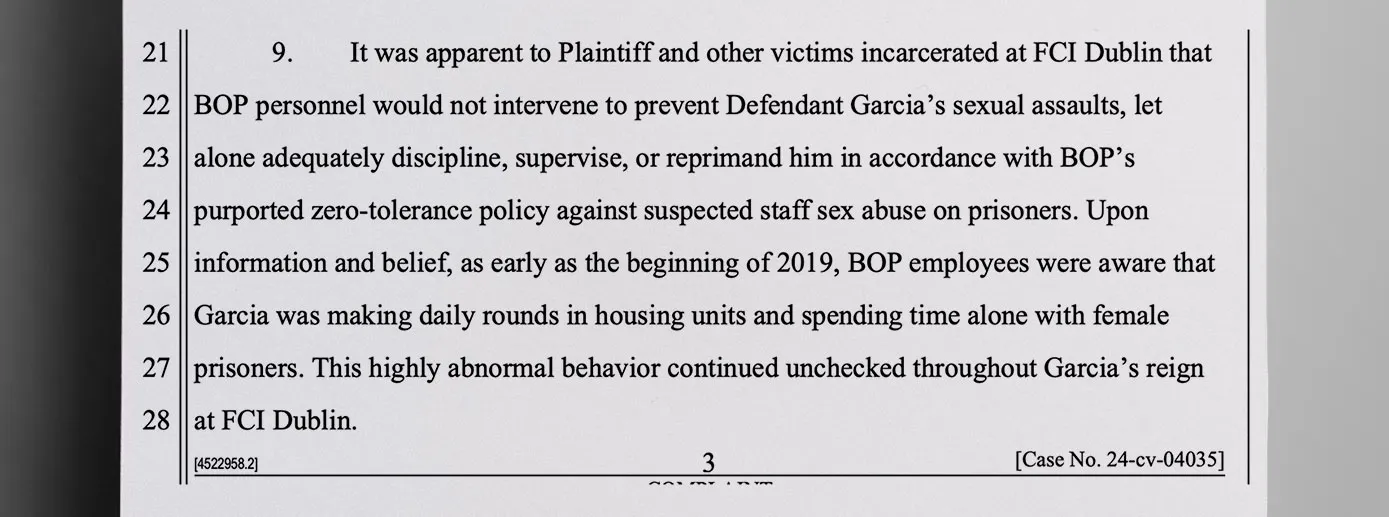
The basic argument of the suit is that Garcia “exploited his position and power to stalk, sexually harass, assault, and sexually abuse at least 10 individuals who were incarcerated at FCI Dublin.”
M.F.L. said that while incarcerated at Dublin in 2021, she was “sexually harassed, abused, and assaulted by Defendant Garcia on repeat occasions” and “suffered her sexual abuse in silence, lest she was retaliated against or deprived of the modest privileges she had as incarcerated individuals.”
The abuse ended only because Garcia was put on administrative leave in July 2021. He was charged in September 2021 with sexually abusing an inmate.
The suit says Garcia “used FCI Dublin as his playground, systematically grooming, manipulating and preying upon powerless victims.” It recounts the judge and prosecutor remarking that Garcia’s actions “not only injured his direct victims but also set the tone for the rest of FCI Dublin.”
The suit points out that not only have seven of Garcia’s subordinates been charged with sexually abusing inmates, but 14 others have been placed under investigation for sexual misconduct.
“Under Garcia’s leadership, FCI Dublin became a cesspool of sexual abuse,” the suit asserts.
Promoted Instead of Prosecuted
M.F.L.’s attorneys note that even though there were suspicions and allegations of Garcia’s abuse of inmates, he was promoted from associate warden to warden in November 2020 rather than prosecuted as a sexual predator.
“With the willful ignorance and tacit approval of his colleagues, Defendant Garcia continued his predatory reign on FCI Dublin, leaving countless victims in his wake, including the Plaintiff,” the lawsuit states.
Specific allegations of Garcia’s abuse of M.F.L. describe that from March to July 2021, Garcia groomed her with flattery and promises of compassionate release and then escalated to making her strip naked when he did his rounds, pose for nude photos and look at pictures of his penis.
“Garcia’s visits to M.F.L.’s cell to demand sexual favors became so frequent that other BOP personnel, as well as prisoners, took notice,” the lawsuit states. “Yet nothing was done to stop his assaults from escalating further.”
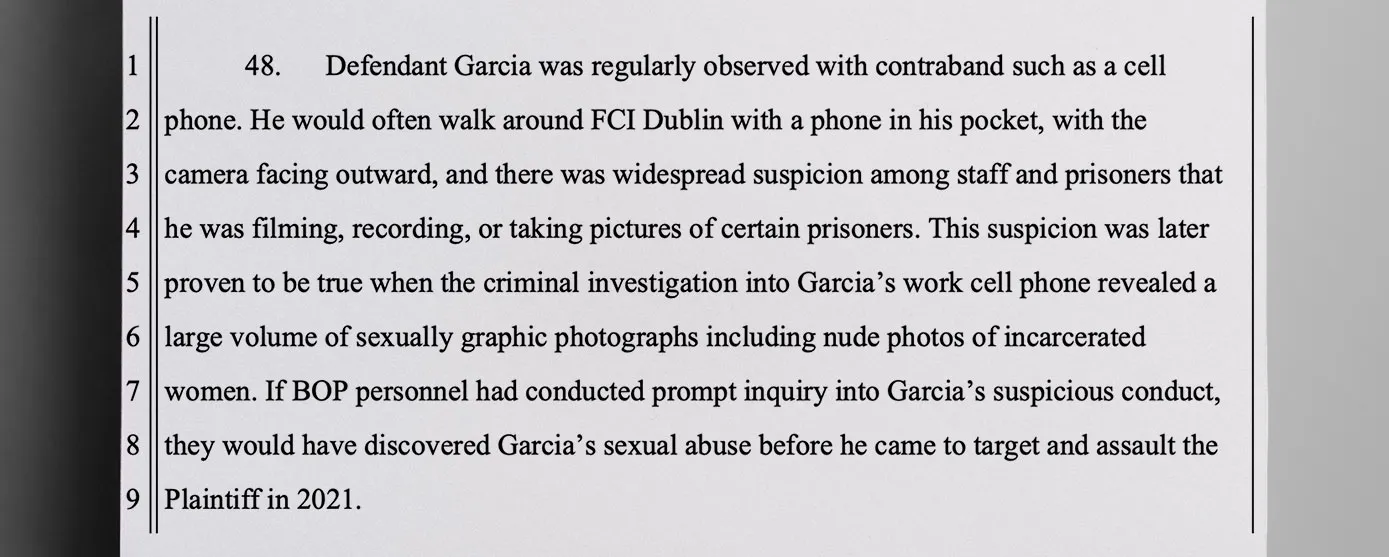
Another strong condemnation in the lawsuit is that Garcia “demonstrated by his behavior that sexual abuse was acceptable. Many officers at FCI Dublin interpreted Garcia’s behavior as carte blanche to do with the prisoners as they pleased. Sexual abuse, sexual assault, and sexual harassment ran rampant throughout the facility, and Garcia implied by his conduct that the perpetrators would not be punished.”
Those women who filed a complaint alleging sexual abuse were sent to the Special Housing Unit during the “investigation” of their allegations. He would even send the inmate’s cellmates to SHU during that “investigation.”
The SHU refers to the Special Housing Unit– a seemingly innocuous term that really means punitive solitary confinement.
This happened to M.F.L. when one of her cellmates was “accused” of having a sexual relationship with a corrections officer. Although inmates cannot legally consent to sex, and any fault in such a relationship rests on the officer, the suit notes that the complainant, M.F.L. and their other cellmate were placed in SHU and treated as though they were being disciplined.
“From this experience, M.F.L. learned that collective punishment would result if her interactions with Garcia became known to others,” the suit notes. “M.F.L. recalls that sexual harassment by Defendant Garcia became more frequent and noticeable after she was released from the SHU around June 2020 and was placed in a different cell than before.”
The Pandemic Made It Worse
The suit further alleges that when the prison was put into lockdown in March 2020 due to the COVID pandemic, “Garcia’s sexual abuse further escalated.” The lockdown gave Garcia more control over the movements of staff and inmates, allowing him “to isolate, terrorize and abuse his victims at will.”
Garcia allegedly told people “he would never lift the lockdown as long as he was at FCI Dublin because, with it, he could move as he pleased.”
Even after Garcia had been removed from the facility, the lawsuit states M.F.L. “felt overwhelmed, ashamed and uncertain regarding how to process her victimization by Garcia. She began having thoughts of committing suicide by overdosing on pills. As is common for victims of sexual abuse, she blamed herself for having fallen prey to Garcia’s manipulation.”
She was released in July 2022. She found out Garcia had denied her compassionate leave request in July 2021 but never told her because he continued to use it as leverage to gain sexual favors.
The suit contends the woman still “suffers from depression, daily intrusive thoughts regarding sexual abuse, sleep difficulties, low self-esteem, feelings of worthlessness and helplessness, and sexual distress that negatively affects intimacy with her partner.”
On Oct. 1, 2023, she was hospitalized following a suicide attempt. The hospital reported she had severe PTSD symptoms.
Revolving Door
When Garcia was finally placed on administrative leave under investigation for his crimes in July 2021, Dublin FCI apparently installed a revolving door in the warden’s office. T. Ray Hinkle was interim warden until Thahesa Jusino was appointed in March 2022. When Jusino retired in late 2023, Art Dulgov took the helm of the troubled prison. He was removed in March 2024 over allegations he and staff had retaliated against an inmate who testified in a federal court hearing about sexual abuse at the prison.
Nancy T. McKinney was tapped as interim warden and served in that capacity until the prison was ordered to be closed in mid-April. It was completely vacated by May 1.
Doors Are Closed; Case Is Still Open
Though FCI Dublin has closed for good, the civil cases are multiplying, and criminal ones might, too.
U.S. District Judge Yvonne Gonzalez Rogers, who is adjudicating the class action suit against the prison, has made clear that the BOP will not avoid consequences by simply closing the Dublin women’s facility. On Sept. 5, Rogers denied the BOP’s motion to dismiss the class action lawsuit.
“The BOP asserts, in a cursory, one-page declaration, both that it does not intend to re-open FCI Dublin, at least in the short-term, and that its other facilities are now providing the FCI Dublin adults in custody (AICs) with adequate care,” Rogers wrote. “In other words, the BOP’s position is that all is now well, and continued intervention is unnecessary.
“The Court is not so easily persuaded,” she wrote in her opinion. “The notion that the constitutional injuries alleged by FCI Dublin’s AICs were comprehensively remedied by the facility’s closure strains credulity. Redressable injuries stemming from the AICs’ experiences at FCI Dublin remain to be addressed, and the BOP is well aware of this fact.”

The judge reminded the lawsuit defendants that she “has previously taken and continues to take steps to safeguard class members by requiring the BOP to address medical, mental health, programmatic, administrative and other failures arising out of class members’ experiences at FCI Dublin.” She claimed these efforts are measured, tied directly to the allegations in the complaint and are proper under the law.
“Thus, having carefully considered the briefing, pleadings, and oral argument at the hearing on August 2, 2024, and for the reasons set forth below, the BOP’s motion to dismiss and request for a stay of discovery are DENIED,” Rogers asserted.
Rogers told both sides to prepare for a jury trial on June 23, 2025.
Class Action Allegations
While many inmates seek individual compensation for their abuse at the hands of their captors, one group of inmates has obtained status as a class to represent all who endured life at “Rape Club Prison.” We will not list individual allegations of abuse but will look at the overall justification for the class action lawsuit filed in the U.S. District Court for Northern California.
The suit was filed in August 2023, several months before the chain of events that led to the prison’s abrupt closure on May 1, so the attorneys’ comments about the prison are in present tense rather than past tense.
As noted previously, the government argued the problem no longer existed because the prison was closed. The judge disagreed and set a trial date of June 23, 2025.
The eight inmates’ attorneys said their clients and “class members they represent” endured “horrific abuse and exploitation at the hands of facility staff, including but not limited to: rape and sexual assault; manipulation and sexual coercion, including officers entering into relationships with incarcerated individuals and officers forcing incarcerated individuals to undress in order to be released from cells or for exchange of goods; degrading sexual comments; voyeurism and taking and sharing explicit photos; drugging, groping, and other forms of abuse during medical exams; and targeted abuse towards immigrants under threat of deportation.”
The plaintiffs seek to make the BOP a party to the suit by alleging it “has been aware of these problems for decades and has failed, and continues to fail, to take action to protect those in its care by preventing and addressing rampant staff sexual misconduct.”
The suit alleges that “staff protect their abusive colleagues by failing to investigate claims or respond meaningfully, and by retaliating against those who report abuse.” Inmates “have no way to safely report sexual misconduct. Survivors must frequently report to the same staff members who abused them or who allowed the abuse to occur.”
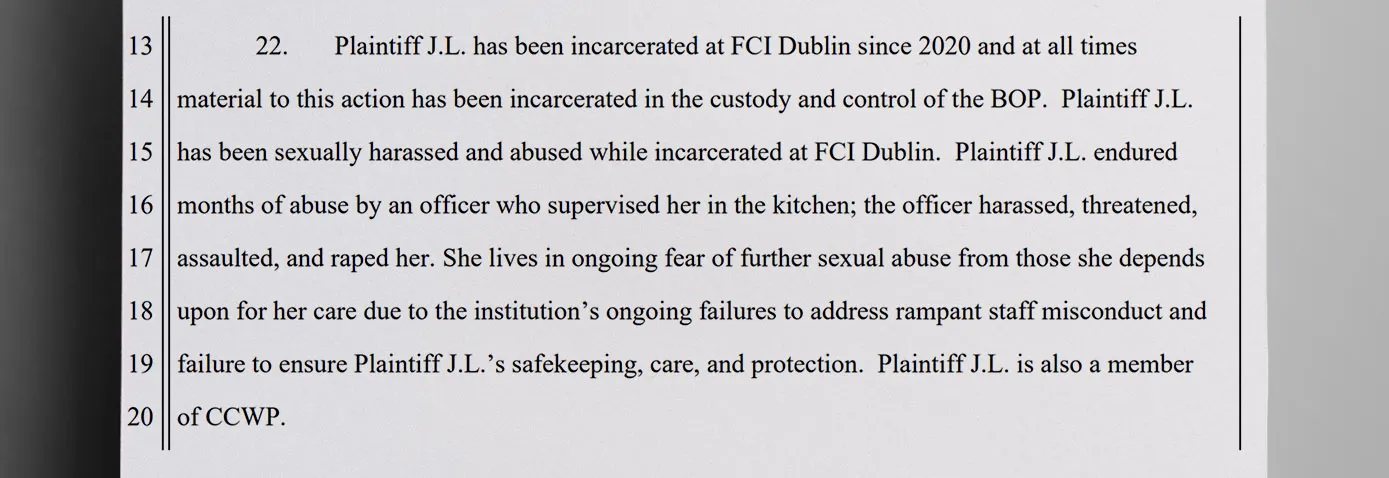
When victims have attempted to send reports directly to the DOJ via a “confidential” email system, “they must do so on public computers in full view of staff and other incarcerated persons. Those reports are often, in turn, sent back to FCI Dublin officials. As a result, survivors frequently face immediate retaliation, including placement in solitary confinement, repeated and unjustified strip and cell searches, and transfer to other facilities away from their families and support systems.
“This pervasive retaliation deters many survivors from reporting their abuse,” the suit notes.
Rogers’ ‘Valentine’ to Dublin Officials
Just a few months after he became warden, Art Dulgov received a “valentine” from the judge – an unannounced visit on Feb. 14, during which she spoke privately to about 100 inmates outside of the presence of any BOP staff.
A few weeks later, FBI agents armed with a search warrant swept through the prison. By the end of the day, Dulgov, Associate Warden Patrick Deveney and two other prison officials had been dismissed.
This was, as the Legal Information Services Assistance (LISA) Foundation reported in its March 14 newsletter, believed to be linked to the suspected retaliation against inmate Rhonda Fleming, who testified in a January 2024 hearing. Shortly after that hearing, Fleming was sent to “solitary confinement” for allegedly possessing contraband – two screws – which she said were planted by guards as a pretense to punish her for her testimony.
Fleming staged a seven-day hunger strike to protest her isolation and the deplorable living conditions in the SHU cell and was transferred to another prison facility.
Fleming Shines Light on Retaliation
There were 13 incarcerated women who testified in early January that “changes” prison officials said had been implemented at Dublin “failed to stop ongoing harassment, abuse and retaliation,” the LISA report noted.
Rogers criticized prison officials for putting inmates who reported sexual harassment and abuse in “protective custody” in the Special Housing Unit (SHU) – the same area where inmates being disciplined for an infraction are placed.
In response to excuses that solitary confinement was not meant to be a punishment, Rogers said, “It’s hard to say it’s not punitive when you’re restricted to an hour, maybe an hour and 15 (minutes) outside, which is vastly different from general population.”
“You’re treating them just like someone who is being disciplined, which suggests it’s punitive,” the judge added.
Rogers issued an order forbidding any of the 13 witnesses to be transferred. However, that did not stop officials from sending Fleming to the SHU as a “security threat.”
In a February 2024 article, the California Coalition of Women Prisoners, who represents the eight women in the class action lawsuit, noted that in defiance of Rogers’ order forbidding the transfer of the witnesses, Fleming was sent to the Metropolitan Detention Center in Los Angeles on Feb. 6. A court document containing Fleming’s statement of events says the disciplinary charges were dismissed due to lack of evidence and she was returned to Dublin on Feb. 16.
Fleming alleges “Officer Ferguson” (no first name given) said he and “Lt. Baudizzon” (no first name) were against sending her to the SHU. Warden Dulgov and Assistant Wadren Delveney told them Fleming “had to be placed under investigation and put into the SHU and to ‘find something and that’s an order.’”
Ferguson and Baudizzon went through Fleming’s emails, viewed surveillance videos of family visits and monitored phone calls but found no rules violations to justify sending her to SHU. She was sent to the unit anyway and ultimately transferred to MDC-Los Angeles.
It Does Not Please the Court
BOP and DOJ officials got an earful from the judge when she was informed her orders had been intentionally disobeyed.
In a Feb. 15 court order, Rogers said she learned of Fleming’s transfer shortly before her Valentine’s Day visit to the prison. She told federal attorneys for the BOP that she would hold a hearing on Feb. 27 “for the government to show cause why it should not be held in contempt or sanctioned for failure to abide by the court’s order. A response shall be filed within 48 hours of this order.”
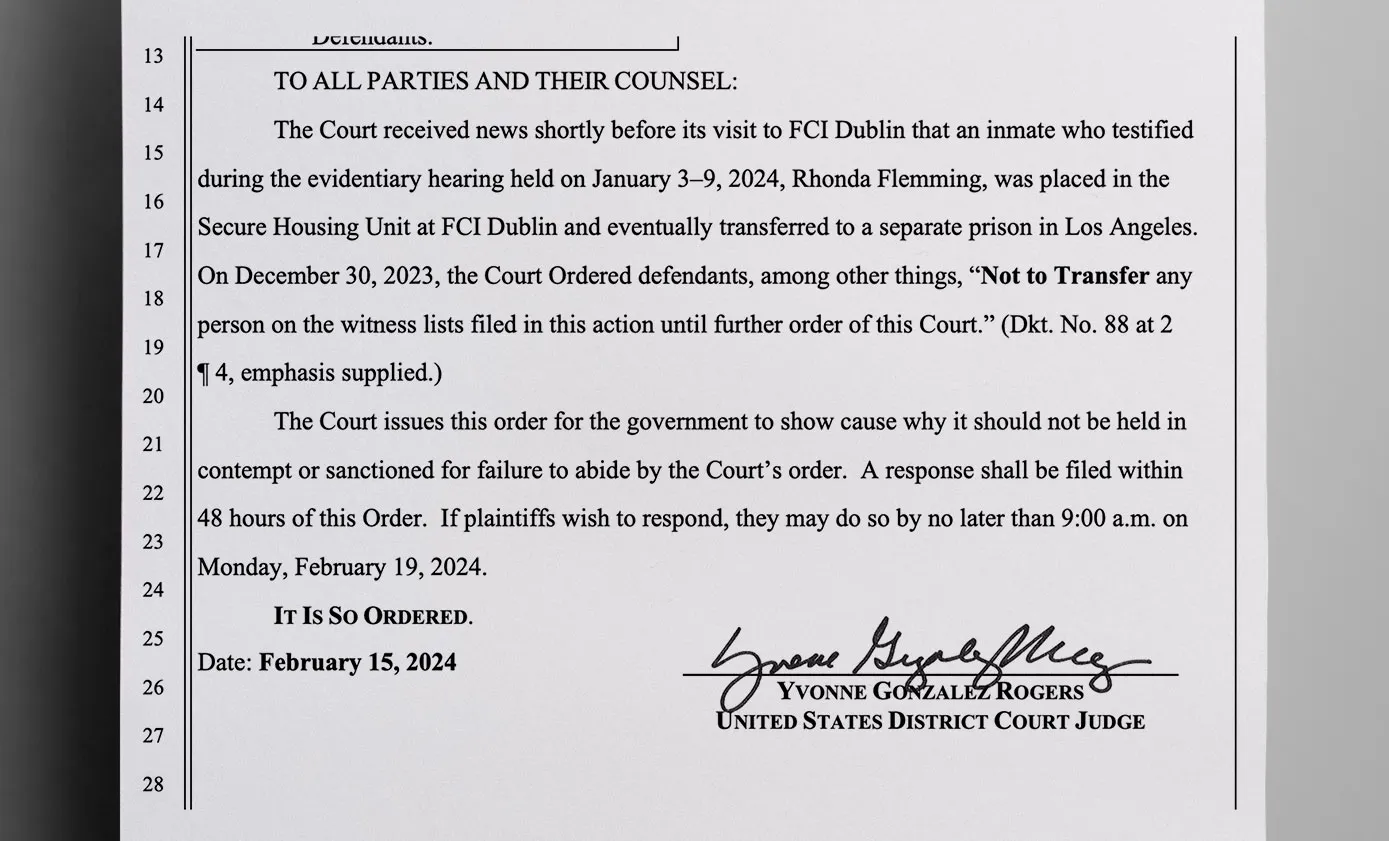
Strangely enough (maybe not so strangely), Fleming was sent back to Dublin on Feb. 16 and cleared of any disciplinary infraction. However, she still feared – and faced – retaliation.
Fleming told the California Coalition that she was ordered to report to the health clinic for an exam, even though she had just had one at MDC-LA.
“Aside from one camera at the entrance, the clinic has no other surveillance cameras — and Fleming knew women who had been sexually assaulted there,” the Coalition states in its article. Fleming said her instinct “told me not to go anywhere with these people,” so she repeatedly refused to be examined.
She was initially refused any fresh clothing when she came back from Los Angeles, but was finally given a set of clothes after she threatened to tell the judge and attorneys.
Rogers Orders Repairs
In a Feb. 16 order to prison officials, Rogers said she spent nine hours at the prison and its adjacent satellite camp on Feb. 14, with most of that time “spent talking to inmates the court approached randomly and in confidence.”
She said her “first-hand communication will prove critical to resolving the pending motions” and ordered that several physical camp deficiencies be addressed. The judge found four showers at the satellite camp were out of service. The other four had no hot water.
“The fact that inmates have only cold showers available is unacceptable, particularly because it is the middle of winter. BOP is ORDERED to resolve this issue IMMEDIATELY,” Judge Rogers wrote in her order.
She gave the warden until Feb. 20 to verify that all four working showers had hot water and that the four out-of-service showers would be repaired and have hot water by the end of February.
The judge also ordered licensed contractors to inspect the camp for gas leaks, black mold and asbestos “AS SOON AS POSSIBLE but no later than Friday, February 23, 2024.”
Rogers said the main prison had complied with an order to issue inmates two blankets, but that had not been done in the satellite camp. She ordered that the second blanket be issued to camp inmates “today, Friday, February 16, 2024” and to confirm by Feb. 20 that it had been done.
Rogers appointed a special master to oversee the problems at Dublin. In April, the BOP decided to close the prison and transfer 600 inmates to other facilities across the country.
A Gaping Loophole in Need of Closing
In all, seven FCI Dublin employees have been sentenced for crimes related to sex abuse, while another awaits sentencing. None of the sentences meted out have exceeded eight years, leaving observers to wonder why the sentences haven’t been longer.
A December 2022 report of the Permanent Subcommittee on Investigations discussed what can only be described as a gaping loophole for predatory prison personnel to avoid consequences for their sexual crimes.
The report states that a 1967 court case ruled that “when a government employer forces an employee to answer questions under oath as a condition of employment, that interview is considered ‘compelled,’ and any inculpatory statements made by the employee during that interview cannot be used against him in a subsequent criminal prosecution.
“In other words,” the report continues, “if a BOP employee admits to sexual misconduct in a compelled interview, statements made during that interview cannot be used against him in a criminal prosecution by OIG or any other law enforcement entity.”
The report said that to pursue criminal charges against a BOP employee who admitted to the crime in a compelled interview, prosecutors “would have to show that it had reasons to pursue criminal charges independent from anything disclosed” in that interview and nothing in that interview could be used as evidence in the case. The practical effect is that if (the BOP employee) can be compelled, it’s a get out of jail free card.”
No More ‘Get Out of Jail Free Cards’?
The report includes “compelled statements” from personnel at the Coleman Correctional Complex in Wildwood, Fla. The Office of Internal Affairs (OIA) “received complaints of sexual misconduct by at least six officers.” The cases were sent to the Office of Inspector General, but that agency “declined to investigate and referred the cases back to BOP OIA to handle administratively.
“BOP OIA compelled each of these officers to sit for interviews,” the report continues, “In those interviews, the officers made sweeping admissions to misconduct, making subsequent criminal prosecution difficult.”
The report includes four of those typed and initialed admissions.
“After reviewing affidavits in these cases in response to the Subcommittee’s request, OIG told the Subcommittee in a briefing: ‘There is no world in which we can say this is a good outcome. These individuals knew they have been compelled and could retire and resign and spill to (BOP) OIA and basically have immunity in some cases for engaging in sexual activity with multiple inmates. It is a terrible outcome.’”
The BOP Inspector General has “recently reformed its complaint screening practices to mitigate the risk of overlooking widespread sexual abuse in a BOP facility by employees again,” the report states. “Although OIA provided the FCC Coleman allegations to OIG on multiple occasions, OIG is also considering a written memorandum with OIA to memorialize BOP OIA’s current practice, such that BOP OIA would have an affirmative, written responsibility to inform OIG of new evidence uncovered during OIA’s administrative investigation” prior to the “compelled interview.”
The report indicates this “could support a criminal investigation.”
In one of the only positive comments in the report, the subcommittee notes the OIG “has taken steps to institute reforms to address the potential difficulties in investigating sexual abuse of female prisoners. OIG has prioritized investigations of sexual misconduct cases, sought additional resources to be able to investigate a higher percentage of sexual misconduct allegations it receives, required its SACs (special agent in charge) to specifically note whether they had determined if the subject of an incoming complaint had previously been accused of misconduct, and is proactively analyzing case information in its database to identify ‘hot spots’ by individual and institution.”
The subcommittee interviewed Dublin’s former warden, Wiley Jenkins – Garcia’s predecessor – and asked him if Dublin had a “culture of abuse,” as the several criminal prosecutions of employees might indicate. Jenkins answered, “No.”
“In his view, sex abuse by BOP employees at FCI Dublin did not reflect broader issues at the prison,” the report stated. “His remedy for BOP employee sexual abuse of female prisoners at the scale of FCI Dublin would be the same as his remedy for a one-off case of sexual abuse.
“‘It goes back to individual choices of people making poor decisions,’ he said.” the report added.
Will Things Get Better?
There are those who dare to hope these crimes and the media attention they have received will improve the conditions in our federal prisons and prevent more victims.
Some see the recently enacted Federal Prisons Oversight Act as a light of hope at the end of this dark tunnel. Cynics might say that light is the headlight of a federal freight train, running on the same tracks it has always traveled, still on the same course and hell-bent on running over anything that gets in its way.
President Biden signed the bipartisan act into law on July 25 in what a Senate press release called “historic prison reform legislation to overhaul independent oversight of the Federal Bureau of Prison’s 122 facilities nationwide by mandating routine inspections of all facilities by the DOJ Inspector General and establishing a new Ombudsman to investigate the health, safety, welfare, and rights of incarcerated people and staff.”
Sen. Jon Ossoff (D-Georgia), a sponsor of the bill, said, “The human rights crisis behind bars in the United States is a stain on America’s conscience,” and Congress “will no longer tolerate the ongoing and widespread abuse of those who are in Federal Bureau of Prisons’ custody.”
So does that mean this may be the last article you will ever read about the sexual abuse of inmates by prison officials?
Sadly, probably not.
For more in-depth reporting and analysis of this and other important topics, subscribe to The Daily Muck.
More From This Author
Cries of the Missing: The Tragedy of Missing/Murdered Indigenous People– ‘None of Us Are Safe Until All of Us Are Safe’
Feature Raymond L. Daye | Dec 11, 2024

Elder Fraud Skyrocketing in Post-Pandemic America
Resource Raymond L. Daye | Dec 2, 2024

Weekly Muck
Join the mission and subscribe to our newsletter. In exchange, we promise to fight for justice.
Weekly
Muck
Join the mission and subscribe to our newsletter. In exchange, we promise to fight for justice.





